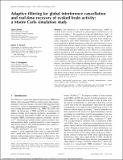Adaptive filtering for global interference cancellation and real-time recovery of evoked brain activity: a Monte Carlo simulation study
Author(s)
Zhang, Quan; Brown, Emery N.; Strangman, Gary E.
DownloadZhang-2007-Adaptive filtering f.pdf (1.183Mb)
PUBLISHER_POLICY
Publisher Policy
Article is made available in accordance with the publisher's policy and may be subject to US copyright law. Please refer to the publisher's site for terms of use.
Terms of use
Metadata
Show full item recordAbstract
The sensitivity of near-infrared spectroscopy (NIRS) to evoked brain activity is reduced by physiological interference in at least two locations: 1. the superficial scalp and skull layers, and 2. in brain tissue itself. These interferences are generally termed as “global interferences” or “systemic interferences,” and arise from cardiac activity, respiration, and other homeostatic processes. We present a novel method for global interference reduction and real-time recovery of evoked brain activity, based on the combination of a multiseparation probe configuration and adaptive filtering. Monte Carlo simulations demonstrate that this method can be effective in reducing the global interference and recovering otherwise obscured evoked brain activity. We also demonstrate that the physiological interference in the superficial layers is the major component of global interference. Thus, a measurement of superficial layer hemodynamics (e.g., using a short source-detector separation) makes a good reference in adaptive interference cancellation. The adaptive-filtering-based algorithm is shown to be resistant to errors in source-detector position information as well as to errors in the differential pathlength factor (DPF). The technique can be performed in real time, an important feature required for applications such as brain activity localization, biofeedback, and potential neuroprosthetic devices.
Date issued
2007-07Department
Harvard University--MIT Division of Health Sciences and Technology; Massachusetts Institute of Technology. Department of Brain and Cognitive SciencesJournal
Journal of Biomedical Optics
Publisher
SPIE
Citation
Zhang, Quan, Emery N. Brown, and Gary E. Strangman. “Adaptive Filtering for Global Interference Cancellation and Real-Time Recovery of Evoked Brain Activity: a Monte Carlo Simulation Study.” Journal of Biomedical Optics 12, no. 4 (2007): 044014. © 2007 Society of Photo-Optical Instrumentation Engineers
Version: Final published version
ISSN
10833668
1560-2281